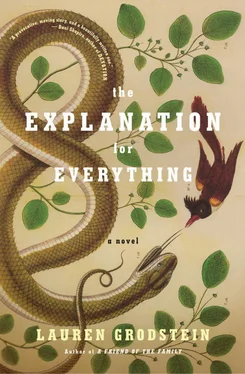“Well, nothing is totally provable.”
“Actually, some things,” he said. “Some things are.” He watched her heavy face crumple, then rearrange itself in an expression of fierce determination.
“But Darwinism is unprovable too, right?” she said. “It’s just a theory too—I mean they call it the theory of evolution, don’t they?”
Ah, this old chestnut. “But when scientists use the word theory, they don’t mean something that can’t be explained. They call it the ‘theory of gravity,’ for instance, but the force of gravity isn’t open to debate.”
“So maybe there’s another explanation for life on earth,” Melissa said. “A better one than just natural selection or whatever kind of crap that is.”
Natural selection or whatever kind of crap. Andy sighed: American education.
“I was thinking,” she continued, “what you’re doing in this lab is experimental. I mean your whole career is based on things that are experimental, isn’t it? Isn’t that what science professors do? So couldn’t you help me design some kind of experimental system, some kind of curriculum, to help me prove that there was an intelligent force behind the creation of the planet? Just, like, an experiment? And then if it doesn’t work then, whatever, at least we tried.”
Andy sighed, ran a hand through his hair. He had spent the past five years at Exton Reed just, like, experimenting, trying to prove that the genetics of alcoholism lead to immutable behavior patterns. Something as basic as this—genes lead to behaviors—felt, at this moment, impossible to prove, felt like trying to prove that the Beatles were better than the Rolling Stones. Who could say for sure? Weren’t there outlying examples? He had, for the past four years, overseen a small laboratory and a vivarium which stocked, at the moment, forty-two mice in varying shades of drunk. He clocked more hours with these mice than he did with almost anyone else in the world. And yet even they remained essentially mysterious to him, even after he cut them open and looked inside their brains. Four years and hundreds of mice and thousands of dollars and simple questions of behavior could not be solved, so how on earth did this girl want to solve the origins of life?
Or, to put it another way: how to explain to a girl like this the difference between that which could be quantified and that which could be taken only on faith?
Andy looked down at the glossy black lab table, saw his face reflected back. He was forty for a few more months, and looked exactly forty, exactly average, except for what might be thicker-than-average sandy-colored hair. He had blurry bags under his eyes. He no longer slept very well. He was haunted by a ghost.
“Melissa, I’m an advocate of student inquiry, I really am,” he said, hearing himself retreat to pedantry, irritating even himself. “And if you’d like to inquire into the nature of God, I’m sure you can find a religion professor—”
“I don’t want to inquire into the nature of God. That’s what I do at church, not at school.”
“Exactly.”
“I want to study the origin of life, and that’s something you study in the biology department.”
“I suppose so,” Andy said. “But I think it depends on the way you undertake the study.”
“So you’re saying you won’t support my research,” the girl said. Her voice was matter-of-fact, but she was slumping.
“Melissa,” Andy said, “the thing about intelligent design is that there’s no way to put the theory through the scientific method, so there’s no way to say whether or not it’s right or wrong. I can’t support your research because there’s no real research that can be performed on the subject. No way to apply the scientific method toward questions of intentionality in the design of the planet.”
“So you won’t sponsor me?”
The black-rimmed clock above his lab table clicked loudly toward 3:55. It would take him thirty minutes minimum to get to Rachel’s practice, and he still had a few papers to file upstairs. Still, the look on this girl’s face, disappointed, maybe even disgusted. Well. It was the first day of the semester. Would it kill him to try to be a little generous? To try to recapture just a bit of the optimism with which he’d arrived this morning?
“Let’s brainstorm for a minute, Melissa. I bet we could come up with something else. Something we could try out in the lab—maybe we could even do a little experiment with the mice. Would that work for you?”
“No,” she said.
Andy forced himself not to sigh. The clock ticked again, as was its irregular habit.
“Intelligent design,” said the girl, “or nothing,” and first Andy wanted to punch her, but then, regarding her stubborn expression, felt curiously and briefly cheered. A determined student! Well, good on her. Also he thought, fuck this, he had to get out of there, he needed to prep for tomorrow’s undergraduate onslaught, and he wanted to see his daughter’s practice, but Melissa looked so grim, so enormous with steely grimness, that despite himself he pulled out the stool from behind his lab table and with a chivalrous hand gesture invited her to sit down.
“There are so many issues concerning evolution that scientists haven’t even begun to fathom, Melissa. I feel certain there’s something you’d find interesting if you just agreed to look.”
She shook her potato-shaped head. “I have a question for you, Professor Waite.”
He noted that her eyes were surprisingly light, a greenish gray.
“There are two ways to see the world, right?” she said. “I mean, there are probably many more than two ways, but what I’m asking you here is to imagine two ways of looking at the world.”
“Two ways,” Andy said, neither frustrated nor hurried. “Fine.”
“There’s your way,” she said, “where everything is accidental, where the fact that the earth tilts on an axis, the fact that it has a moon to control the tides, the fact that it is just the exact distance from the sun to keep us warm without boiling us alive—and even more than that, the fact that we’re here, the fact that we love each other and protect each other, is all an accident of timing and chemicals.”
“That’s my way?”
“Yes,” Melissa said. “That is your way, because that is the way of Darwin, which says that we are no more important, no more intentional, than the dust on your desk. We might as well be like your caged mice for all the agency we have in the grand scheme of things.”
“All right,” Andy said, neither aggravated nor impatient.
“But here’s your other option. A world in which life has purpose,” Melissa said. “God put us here for a reason, and that reason is out in the world for us to discover. There’s a reason we can see stars in the sky. There’s a reason we can dig into the crust of the earth and find out what came before us. There’s a reason we were given the kinds of brains that would further your… scientific inquiry. There’s a reason for life. There’s a design behind it.”
Andy did not look at the clock. “I see what you’re saying, Melissa, but that’s not a binary I’m comfortable with.”
“Your world is the world of coincidence, of meaninglessness. You choose the world that would have us as specks of dust, as mice in a cage. Is that the kind of world you want to live in, Professor Waite?”
Andy took a breath.
“Professor?”
He hated these rushes of memory, these forces that sucked him in like dark matter at the least convenient times, shattering him. But there he was, out of the shabby lab in the basement of Scientific Hall and instead in Miami, the apartment in Miami, four lushly carpeted and heavily air-conditioned rooms. It was night, and Lou, hugely pregnant with Belle, was lying down next to Rachel in her big-girl bed. Reading Richard Scarry’s Best Word Book Ever. Giggling together. Louisa’s belly rising up and down.
Читать дальше












